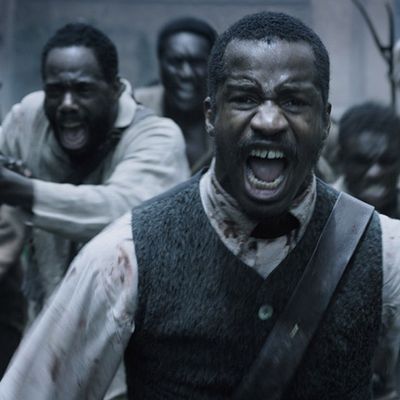
Nate Parker’s standing ovation began even before his film The Birth of a Nation screened at Sundance, as part of the audience rose to its feet for the writer-director-star’s brief pre-film introduction. Since nobody had yet seen the movie, that ovation was probably a testament to the enormous number of friends, cast, and crew that were in attendance. The bigger ovation, the thunderous one that came as the end credits rolled, though? That was a testament to the enormous power of this film.
In the film — which just set a Sundance sale-price record when it was acquired by Fox Searchlight for $17.5 million — Parker plays Nat Turner, the Virginia slave who led an infamous, short-lived rebellion in 1831. It lasted just a couple of days, but it has captured the imaginations of many ever since. At the time, the rebellion was used to justify new, even harsher laws targeting blacks. It has also inspired numerous works of art, music, film, and literature, most notably William Styron’s florid, intense, controversial 1967 novel The Confessions of Nat Turner, and (my personal favorite) Charles Burnett’s lovely 2000 documentary Nat Turner: A Troublesome Property, which itself is about the different ways Turner’s rebellion has been portrayed and interpreted through the years.
“Each author possesses Nat Turner,” it is said in the opening to that latter film, “transforming his identity and the meaning of his revolt.” Nate Parker, in The Birth of a Nation, seems both to possess him and to be possessed by him. Not that much is known of the historical figure, but Parker creates a full, compelling portrait by utilizing what we do know — that Nat was well versed in the Bible, often saw religious visions, and preached to his fellow slaves. In the film, Nat’s childhood friend turned owner, Samuel Turner (Armie Hammer), sells out Nat’s services as a preacher to other landowners who want him to help quell dissent among their slaves. When Nat opens his mouth, the words come out with a force and a rage that betrays the pacifism and love he’s supposed to be preaching.
That inner turmoil haunts the whole film. This is a whole world of deep contradictions, one in which no one is at peace. Many films about slavery contrast elegance and degradation, playing the comfort of the whites against the degradation of the blacks. But in The Birth of a Nation, you get the sense that everybody’s being degraded in some way by the institution of slavery. Sam, once Nat’s closest childhood friend, becomes more and more brutal, driven by his desire to resurrect his family name as well as by the simple fact that the law gives him so much power over other human beings. The contrast here is not so much material as it is spiritual.
As an actor, Parker’s greatest strength is his ability to convey thought onscreen. He’s got probing eyes but a slightly quizzical turn to his mouth, like he’s trying to make sense of what’s before him. (This is one of the many, many reasons why he was so perfect in Beyond the Lights; we could see his romantic yearning and his sense of justice fighting across his face.) As Nat, he has to show that kind of inner conflict even as he shouts Bible verses at his fellow slaves. “I’ve been following the Lord a long time,” he says at one point. “I’m going back through his words with new eyes. For every verse they use to support our bondage, there’s another one demanding our freedom.” The very words he’s invested in are the very words helping to keep them in chains, and there’s anguish mixed in with his religious passion. It’s almost physically painful to watch.
The rebellion itself is an intense and gruesome affair — at times shot like a historical epic, at times like a horror movie, at times like an action movie, complete with a head-crushing, throat-slicing mêlée near the end. (Though Parker was working with a much smaller budget, the film reminded me of Braveheart at more than one point. And it was intriguing to see Mel Gibson’s name pop up in the end-credit thank-yous.) Parker doesn’t shy away from the sheer, unquestioning nature of the violence — he even shows women being slaughtered in their beds. This is discomfiting, grisly stuff, and it’s to the writer-director’s credit that he allows it to remain so without leading us along toward one interpretation or another. It’s an exorcism as much as a historical lesson.
Perhaps the most impressive thing about The Birth of a Nation is how it alternates between the aestheticized and the immediate without compromising either. Scenes of abject horror are intercut with more dreamlike, symbolic passages, creating a push-pull to the narrative. It’s a beautiful, reflective film even as it is also a brutal, visceral one. That stylistic dialectic reflects the turmoil within Nat — his struggle to reconcile the world he sees with the world he reads about in the Bible. And his inability to do so, in essence, powers the explosion of blood that comes at the end. There, I think, is where the film resonates most. More than a movie about a slave rebellion, it’s about the difficulty of reconciling the great moral chasms between thought, vision, and deed.





